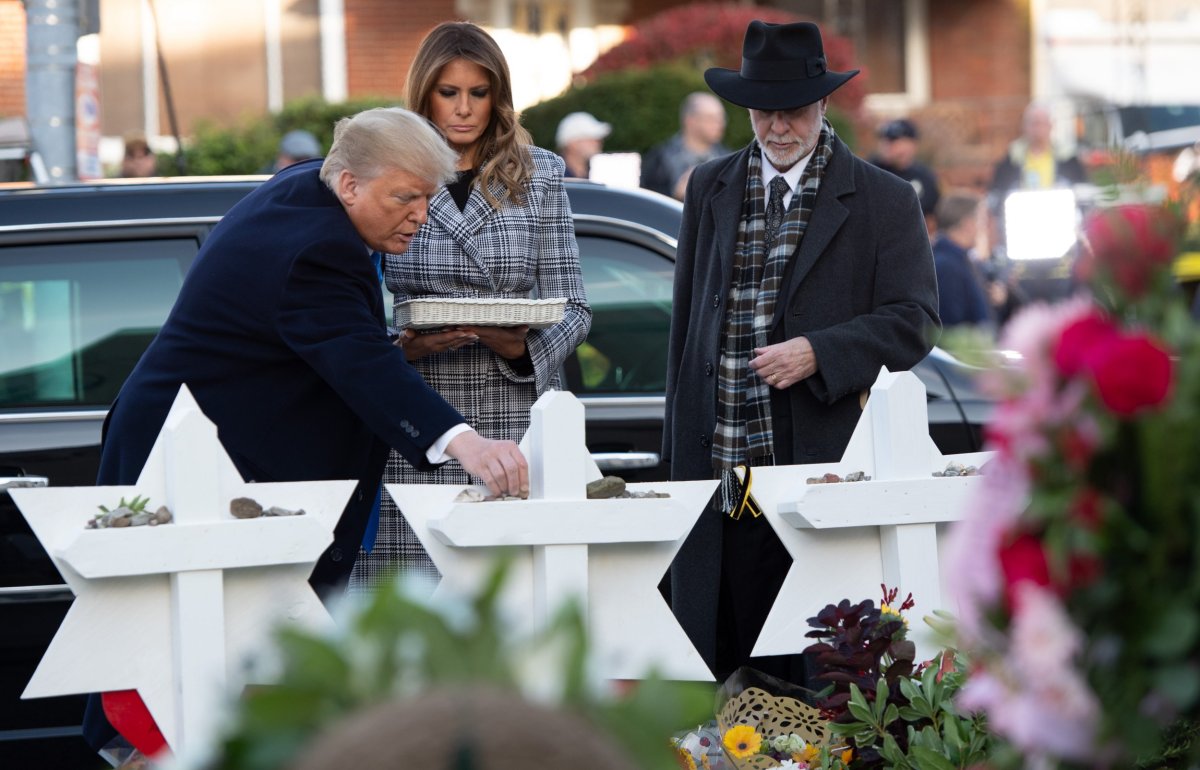A few words on Pittsburgh, before the tragedy recedes permanently into the mists of memory. The calls for civility, which lasted about three days until the white-hot impulses of the electoral process took over again, were not misplaced.
The president was right to go there in the aftermath of the tragedy. The rabbi was right to welcome him to the Tree of Life Synagogue. And the people who screamed at him for coming into their neighborhood were wrong. But it's all to be expected now that social media has supplanted 24-hour news channels as a source of primary information. People are now sharing, freely and unfiltered, comments that might better be left inside the heads of those with whom they originate. The seeming anonymity the web affords has given us license to inject a degree of venom into the political debate that most of us are not used to.

Much of the blame for this is assigned to President Donald Trump. What he says at rallies, what he tweets, what he does simply by existing is, according to the commentariat, emboldening to those who traffic in hate.
But if Trump has made a difference, it's been in the way his attacks on the political correctness the Left has tried to force on the rest of America have signalled to others that pushing back is okay. I'm not sure, though I'm willing to listen to arguments why I might be wrong, why this means Trump should be blamed for the massacre in Pittsburgh any more than Barack Obama, Hillary Clinton and other progressive leaders are to blame every time an Antifa mob throws a vending machine through the window of a coffee shop.
We're nearly the end of a competitive election, one in which a lot of voters are expressing intense feelings about the way the nation should go. The calls for civility are, in some cases at least, a legitimate attempt by thought leaders to allow cooler heads to prevail. In other cases, it's a suggestion to conservatives to tone back their rhetoric—and thereby disarm and disengage from the 2018 campaign.
This would be a mistake. The population of people who vote is closely divided. More than one study shows split-ticket voting is down considerably since the beginning of George W. Bush's presidency. The people are taking up sides. The people are polarizing. Why should anyone be surprised the politicians are doing likewise when so many of them follow rather than lead?
Which brings us back to Donald Trump who is, after all, a salesman. He's made a considerable fortune betting he knew what the people wanted, sometimes even before they knew themselves. And when you see the numbers of people who turn out for his rallies and how they've become all-day events you can't help but think he's on to something.
It's not fair or honest to link the president's rhetoric to the mass killing in Pittsburgh, but people are doing it nonetheless. It's yet another indication of how deeply the polarization goes. But as a tactic, it's not new. Reporters, commentators and mainstream media publications have been making that kind of linkage since Reagan ran for and won the presidency – and in the most hateful terms.
People forget how Reagan was treated by the opposition while he was in office and the way it was routinely reported, without too much genuinely in-depth analysis, that his policies would cause people to die. And in 1994, the political upheaval that brought the Republicans to power in the U.S House of Representatives was shortly followed up by magazine covers referring to the new House Speaker as "The Gingrich Who Stole Christmas." An irresistible pun? Perhaps. But again, it was a charge without basis and just as despicable as the "NUCK FEWT" bumper stickers that shortly began appearing on the backs of Volvos, Subarus, and faded VW microbuses from Woodstock, N.Y., to San Francisco, Calif.
Even more egregious was the baseless allegation made in a third-party radio ad during the 2000 presidential campaign suggesting George W. Bush had silently condoned the dragging of a black man to his death behind a pick-up truck driven by some rednecks, who paid the ultimate price for their crime.
The truth is that civility is not something Americans value highly in political campaigns. They want to be offered a clear choice: bold colors rather than pale pastels, as Reagan famously said. And pointing out that choice does not equate to hate speech. No one seemed to think so, at least, when the Democrats ran a TV spot showing House Speaker Paul Ryan pushing his wheelchair-bound grandmother over a cliff. The fault for all that may be wrong is not all on one side.
Newsweek contributing editor Peter Roff is has written extensively about politics, culture, and the media for U.S. News and World Report, United Press International, and various other publications. He can be reached by email at RoffColumns@GMAIL.com. Follow him on Twitter @PeterRoff.
The views expressed in this article are the author's own.
Uncommon Knowledge
Newsweek is committed to challenging conventional wisdom and finding connections in the search for common ground.
Newsweek is committed to challenging conventional wisdom and finding connections in the search for common ground.
About the writer
To read how Newsweek uses AI as a newsroom tool, Click here.








